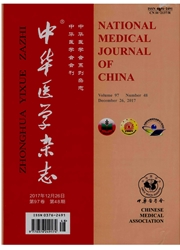

 中文摘要:
中文摘要:
目的 分析探讨采用单一冷冻消融(TCAP)治疗T3N0M0期前列腺癌的有效性、安全性和临床应用价值.方法 采用直肠超声引导下TCAP技术方法,观察分析治疗前后前列腺特异抗原(PSA)、前列腺体积、MRI、MRS及病理变化,1、2、3年无生化复发生存率(bRFS)、临床进展变化、生命质量评价.结果 技术成功率100%,随访10~45个月,与治疗前比较,血清PSA明显下降(P<0.01);前列腺体积明显缩小(P<0.01);1、2、3年bRFS分别为92.5%(37/40)、87.1%(27/31)、73.3%(11/15).生活质量调查,性生活质量治疗后6个月呈下降趋势,但差异无统计学意义(P=0.06),12个月恢复至治疗前水平;排尿症状明显改善(P<0.01).本组治疗后3年内出现临床进展24.4%(11/45),其中,局部复发者占54.5%(6/11),盆腔淋巴结和(或)远处转移者占45.5%(5/11).局部复发者复用TCAP,随访5~15个月效果满意;盆腔淋巴结和(或)远处转移者采用药物内分泌治疗,随访6~13个月均为生化无进展生存.本组治疗副反应轻微、并发症少,未见尿道直肠瘘等严重并发症发生,治疗安全.结论 采用单一TCAP治疗T3N0M0期前列腺癌3年随访效果满意,其临床应用价值值得进一步探索.
 英文摘要:
英文摘要:
Objective To evaluate the clinical efficacy, safety and application value of rectal ultrasound-guided targeted cryoablation of prostate (TCAP) in the treatment of T3N0M0 prostate cancer.Methods Transrectal ultrasound (TRUS)-guided TCAPs were performed. And prostate-specific antigen (PSA), TRUS-measured prostate volume, endorectal magnetic resonance imaging (MRI) and spectroscopic imaging (MRSI) at before, 12, 24, 36 months after TCAP were recorded and evaluated. The biochemical relapse free survival (bRFS) and clinical progression (local recurrence and distant metastasis) at 1,2 and 3 years post-cryoablation were also recorded. The post-TCAP quality of life was also observed by the EORTC questionnaire QLQ-PR25. Results The sudess rate of this technique was 100%. The follow-up period had a range of 10 to 45 months. The PSA level decreased dramatically (P 〈 0.01 ). The TRUS-measured prostate volumes significantly decreased( P 〈 0.01 )versus those at pre-cryoablation. The bRFS at 1 , 2 and 3 years post-TCAP was 92.5% ( 37/40), 87.1% ( 27/31 ) and 73.3% ( 11/15 ) respectively. The result of quality of life showed that the sexuality scores decreased at 6 months post-TCAP, but there was no statistical significance (P = 0.06 ) and recovered to baseline level at 12 months. Urinary symptoms improved significantly (P 〈 0.01 ). The clinical progression rate in this study at 3 years was 24.4% (11/45). To be specific, local recurrence rate was 54.5% (6/11) and distant metastasis rate 45.5% (5/11). Repeated cryoablation was performed for the patients with local recurrence and satisfactory results were achieved during a follow-up of 10 - 15 months. Endocrine treatment was adopted for the patients with distant metastasis and appeared to have biochemical progression free survival during a follow-up of 6 - 13 months. The therapy was safe. Most of side effects were mild and there was no occurrence of severe complications such as urethral fistulas, etc. Conclu
 同期刊论文项目
同期刊论文项目
 同项目期刊论文
同项目期刊论文
 期刊信息
期刊信息
